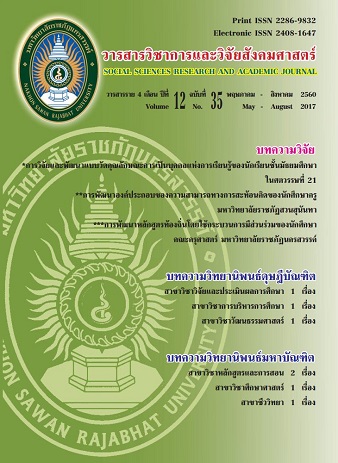ความสัมพันธ์ระหว่างการใช้อำนาจของผู้บริหารสถานศึกษากับความผูกพันต่อองค์การของครู สังกัดสำนักงานเขตพื้นที่การศึกษามัธยมศึกษา เขต 8; The Relationship between the Power Use of School Administrators and the Organizational Commitment of Teachers under the Seco
Main Article Content
Abstract
การวิจัยครั้งนี้มีวัตถุประสงค์เพื่อศึกษา 1) การใช้อำนาจของผู้บริหารสถานศึกษา 2) ความผูกพันต่อองค์การของครู และ 3) ความสัมพันธ์ระหว่างการใช้อำนาจของผู้บริหารสถานศึกษากับความผูกพันต่อองค์การของครู สังกัดสำนักงานเขตพื้นที่การศึกษามัธยมศึกษา เขต 8 กลุ่มตัวอย่างที่ใช้ในการวิจัย คือ ครูสังกัดสำนักงานเขตพื้นที่การศึกษามัธยมศึกษา เขต 8 จำนวน 346 คน สุ่มตัวอย่างแบบแบ่งชั้นตามขนาดของสถานศึกษา เครื่องมือที่ใช้ในการวิจัยเป็นแบบสอบถามเกี่ยวกับการใช้อำนาจของผู้บริหารสถานศึกษาและความผูกพันต่อองค์การของครู วิเคราะห์ข้อมูลโดยหาความถี่ ร้อยละ ค่าเฉลี่ย ส่วนเบี่ยงเบนมาตรฐาน และค่าสัมประสิทธิ์สหสัมพันธ์แบบเพียร์สัน ผลการวิจัยพบว่า
- การใช้อำนาจของผู้บริหารสถานศึกษา สังกัดสำนักงานเขตพื้นที่การศึกษามัธยมศึกษา เขต 8 โดยภาพรวมและรายด้าน 6 ด้าน อยู่ในระดับมาก ได้แก่ ด้านอำนาจตามกฎหมาย ด้านอำนาจจากข่าวสารด้านอำนาจจากการอ้างอิง ด้านอำนาจจากความเชี่ยวชาญ ด้านอำนาจจากการพึ่งพา และด้านอำนาจจากการให้รางวัล ส่วนด้านอำนาจจากการบังคับอยู่ในระดับปานกลาง
- ความผูกพันต่อองค์การของครูสังกัดสำนักงานเขตพื้นที่การศึกษามัธยมศึกษา เขต 8 โดยภาพรวมและรายด้านอยู่ในระดับมาก ทั้งด้านการยอมรับเป้าหมายขององค์การ ด้านการเต็มใจ ทุ่มเท เสียสละเวลาให้กับองค์การ และด้านการปรารถนาที่จะดำรงเป็นสมาชิกขององค์การ
- การใช้อำนาจของผู้บริหารสถานศึกษาโดยภาพรวมกับความผูกพันต่อองค์การของครูโดยภาพรวม สังกัดสำนักงานเขตพื้นที่การศึกษามัธยมศึกษา เขต 8 มีความสัมพันธ์เชิงบวกในระดับปานกลาง อย่างมีนัยสำคัญทางสถิติที่ระดับ .01 โดยมีค่าสัมประสิทธิ์สหสัมพันธ์เท่ากับ .604 โดยการใช้อำนาจของผู้บริหารสถานศึกษามีความสัมพันธ์เชิงบวกในระดับสูงกับความผูกพันต่อองค์การของครูด้านการยอมรับในเป้าหมายขององค์การ และมีความสัมพันธ์เชิงบวกในระดับปานกลางกับความผูกพันต่อองค์การของครูด้านการเต็มใจ ทุ่มเท เสียสละเวลาให้กับองค์การ และด้านการปรารถนาที่จะดำรงเป็นสมาชิกขององค์การ
Abstract
The purposes of this research were 1) to study the power use of school administrators; 2) to study the organizational commitment of teachers; and 3) to study the relationship between the power use of school administrators and the organizational commitment of teachers. The sample consisted of 346 teachers from secondary schools under the Secondary Education Service Area Office 8, obtained by stratified random sampling based on school size. The employed research instrument was a rating scale questionnaire on the power use of school administrator. and the organizational commitment of teacher. Data was analyzed using the frequency, percentage, mean, standard deviation, and Pearson’s product-moment correlation. The research findings were as follows:
- The overall power use and power uses in six power use aspects of school administrators under the Secondary Education Service Area Office 8 were at the high level, with the six power use aspects being ranked from high to low based on their rating means as follows: the legitimate power, the information power, the referent power, the expert power, the connection power, and the reward power, respectively; while the coercive power was rated at the moderate level.
- The overall and by-aspect organizational commitments of teachers were at the high level, with the organizational commitment aspects being specified as follows: the acceptance of organizational goals, the willingness to devote and sacrifice time to the organization, and the desire to remain as a member of the organization.
- The overall power use of school administrators and the overall organizational commitment of teachers correlated positively at the moderate level, with the correlation coefficient of .604 which was significant at the .01 level of statistical significance; specifically, the power use of the school administrators correlated positively at the high level with the teachers’ organizational commitment aspect of the acceptance of organizational goals, and correlated positively at the moderate level with the teachers’ organizational commitment in the aspects of the willingness to devote and sacrifice time to the organization, and the desire to remain as a member of the organization.


